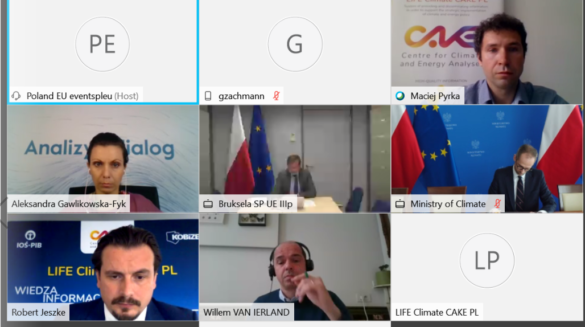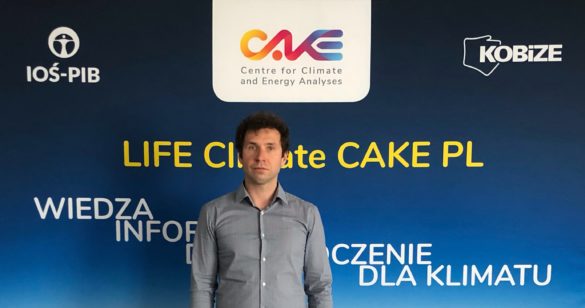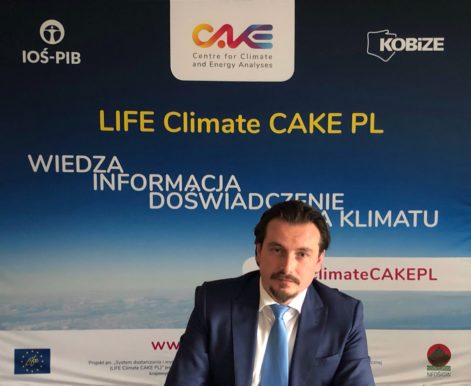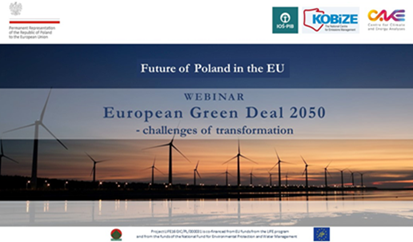Webinar summary: European Green Deal 2050 – challenges of transformation
On May 12, 2020 r. a webinar took place on “European Green Deal 2050 – challenges of transformation” organized by IOŚ-PIB/KOBiZE as a part of LIFE Climate CAKE PL project in partnership with the Permanent Representation of the Republic of Poland to the EU. In a 1.5 hour meeting around 200 participants took part.
 The purpose of the organized webinar was to exchange views on the challenges associated with the transformation towards climate neutrality and the impact of the COVID-19 pandemic on the implementation of the European Union’s ambitious climate and energy policy. Among the distinguished guests at our webinar were Andrzej Sadoś, The Permanent Representative of the Republic of Poland to the EU and Adam Guibourge-Czetwertyński, Undersecretary of State in the Ministry of Climate. The meeting was also attended by Tom van Ierland from DG CLIMA from the European Commission and Georg Zachmann representative of the Bruegel think tank, Robert Jeszke, KOBiZE, Coordinator of the LIFE Climate CAKE PL and Maciej Pyrka, KOBiZE, LIFE Climate CAKE PL CGE model expert .
The purpose of the organized webinar was to exchange views on the challenges associated with the transformation towards climate neutrality and the impact of the COVID-19 pandemic on the implementation of the European Union’s ambitious climate and energy policy. Among the distinguished guests at our webinar were Andrzej Sadoś, The Permanent Representative of the Republic of Poland to the EU and Adam Guibourge-Czetwertyński, Undersecretary of State in the Ministry of Climate. The meeting was also attended by Tom van Ierland from DG CLIMA from the European Commission and Georg Zachmann representative of the Bruegel think tank, Robert Jeszke, KOBiZE, Coordinator of the LIFE Climate CAKE PL and Maciej Pyrka, KOBiZE, LIFE Climate CAKE PL CGE model expert .
The Permanent Representative of the Republic of Poland to the EU, Mr. Andrzej Sadoś emphasized in his opening remarks that the challenges facing Poland and the European Union are unprecedented. They will require not only significant investments, but also far-reaching actions with serious consequences on behalf of a wide range of sectors. The Ambassador referred to the current economic and social situation caused by the COVID-19 crisis while stressing that the scale of the challenges means that the challenge of transformation will be even more difficult than anticipated. Already before the pandemic, the costs of transformation were particularly high for countries such as Poland, and due to the pandemic they are expected to increase even further. Regardless of the level of socio-economic development or the structure of the energy mix, all Member States are faced with new challenges. Strengthening cooperation and building universal tools to stimulate post-crisis reconstruction has a chance to help solve some of the problems.
The Undersecretary of State in the Ministry of Climate, Mr. Adam Guibourge-Czetwertyński, underlined the need for an ambitious and solid recovery plan ensuring the sustainable and equitable development of our continent without burdening the poorest and most vulnerable citizens and regions, and that transformation should lead to a stronger, greener, crisis-proof and united EU.
Mr. Tom van Ierland, DG CLIMA – European Commission, made it clear that raising targets by 2030 despite the current crisis caused by COVID-19 is still a priority for the EC, and the publication of the results of the impact assessment is planned for September this year. The EC representative emphasized that it will be a comprehensive analysis that will assess the possibility of extending the ETS system to the transport and construction sectors. It will also analyze the potential of all EU sectors and policies identified within the European Green Deal (e.g. industrial policy, circular economy, biodiversity, farm to fork) to achieve its goals. The analysis will also cover the role of forests and land use in absorbing emissions. The comprehensive assessment will also consider the impact of COVID-19 and take into account the social aspect, including effects on labour market and employment.
Mr. Georg Zachmann, representative of the Bruegel, drew the attention to the mechanism for adjusting prices at the borders taking into account CO2 emissions, the Energy Tax Directive or the manner of getting revenues to budgets from the auction of emission allowances.
Mr. Maciej Pyrka, KOBiZE, LIFE Climate CAKE PL CGE model expert, presented the results of the analyzes carried out in as part of the LIFE Climate CAKE PL project. In his findings he stressed that implementation of the new greenhouse gas emission reduction targets proposed in the European Green Deal and Climate Law will result in a reduction in the supply of emission allowances in the EU ETS and also trigger a sharpening of current national reduction policies in the non-ETS sectors. The results of the analyzes carried out in as part of the LIFE Climate CAKE PL project suggest that the proposed increase in the reduction target for 2030 may result in a sig nificant increase in prices in the EU ETS in an extreme case up to 76 EUR / ton in 2030. The high price of allowances can generate high costs for industry and lead to carbon leakage (i.e. relocation of production and investment outside the EU). On the other hand, the proposed emission reduction path by 2050 will mean the necessity to reduce practically to zero emissions from the power generation sector and from some industrial sectors in the Member States. The high price of allowances can generate high costs for industry and lead to carbon leakage (i.e. relocation of production and investment outside the EU). On the other hand, the proposed emission reduction path by 2050 will mean the necessity to reduce practically to zero emissions from the power generation sector and from some industrial sectors in the Member States. Referring to the current situation related to the crisis caused by COVID-19, it is necessary to take into account its effects in assessing the impact of the newly proposed regulations and strategies on Member States, which is difficult because we do not yet have full information about the state of the economy after the crisis.
nificant increase in prices in the EU ETS in an extreme case up to 76 EUR / ton in 2030. The high price of allowances can generate high costs for industry and lead to carbon leakage (i.e. relocation of production and investment outside the EU). On the other hand, the proposed emission reduction path by 2050 will mean the necessity to reduce practically to zero emissions from the power generation sector and from some industrial sectors in the Member States. The high price of allowances can generate high costs for industry and lead to carbon leakage (i.e. relocation of production and investment outside the EU). On the other hand, the proposed emission reduction path by 2050 will mean the necessity to reduce practically to zero emissions from the power generation sector and from some industrial sectors in the Member States. Referring to the current situation related to the crisis caused by COVID-19, it is necessary to take into account its effects in assessing the impact of the newly proposed regulations and strategies on Member States, which is difficult because we do not yet have full information about the state of the economy after the crisis.
 Mr. Robert Jeszke, KOBiZE, Coordinator LIFE Climate CAKE PL project underlined that challenges will also be faced by most sectors of classified as non-ETS. First of all, there will be significant changes affecting secors such as: transport, building and agricultural. In his speech he emphasized that in terms of distribution of emission reductions, we should treat EU ETS sectors and non-ETS sectors in such a way that it would not lead to internal carbon leakage, i.e. leakeage from the EU ETS to the non-ETS area, where such an an example can be seen where high prices of EUA allowances cause some heat consumers to disconnect from heating networks and start to use more individual emission sources (e.g. coal boilers). In addition he highlighted the growing emissions in the transport sector and stressed the need to take this problem into account in assessing the impact of the new climate policy for 2030.
Mr. Robert Jeszke, KOBiZE, Coordinator LIFE Climate CAKE PL project underlined that challenges will also be faced by most sectors of classified as non-ETS. First of all, there will be significant changes affecting secors such as: transport, building and agricultural. In his speech he emphasized that in terms of distribution of emission reductions, we should treat EU ETS sectors and non-ETS sectors in such a way that it would not lead to internal carbon leakage, i.e. leakeage from the EU ETS to the non-ETS area, where such an an example can be seen where high prices of EUA allowances cause some heat consumers to disconnect from heating networks and start to use more individual emission sources (e.g. coal boilers). In addition he highlighted the growing emissions in the transport sector and stressed the need to take this problem into account in assessing the impact of the new climate policy for 2030.
The webinar was moderated by Mrs. Aleksandra Gawlikowska-Fyk, responsible for the Power Engineering project within the Energy Forum.
Presenatation:
 CAKE_webinar_European_Green_Deal_12-05-2020.pdf (1.3 MiB, 880 hits)
CAKE_webinar_European_Green_Deal_12-05-2020.pdf (1.3 MiB, 880 hits)
More information on the website: https://www.gov.pl/web/eu/european-green-deal-2050—challenges-of-transformation—webinar

Back

 Reset ustawień
Reset ustawień Kontrast
Kontrast Widok
Widok Czytelność
Czytelność Czcionka
Czcionka Znaki
Znaki Interlinia
Interlinia Słowa
Słowa Akapity
Akapity Deklaracja dostępności
Deklaracja dostępności









